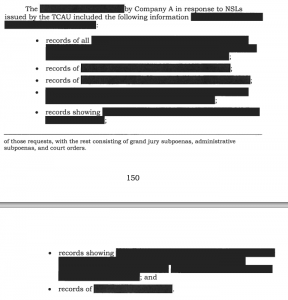Have the Banks Escaped Criminal Prosecution because They’re Spying Surrogates?
I’m preparing to do a series of posts on CISA, the bill passed out of SSCI this week that, unlike most of the previous attempts to use cybersecurity to justify domestic spying, may well succeed (I’ve been using OTI’s redline version which shows how SSCI simply renamed things to be able to claim they’re addressing privacy concerns).
But — particularly given Richard Burr’s office’s assurances this bill is great because “business groups like the Financial Services Roundtable and the National Cable & Telecommunications Association have already expressed their support for the bill” — I wanted to raise a question I’ve been pondering.
To what extent have banks won themselves immunity by serving as intelligence partners for the federal government?
I ask for two reasons.
First, when asked why she, along with Main Justice’s Lanny Breuer, authorized the sweetheart deal for recidivist transnational crime organization HSBC, Attorney General nominee Loretta Lynch implied that there was insufficient admissible evidence to try any individuals associated with this recidivism.
I and the dedicated career prosecutors handling the investigation carefully considered whether there was sufficient admissible evidence to prosecute an individual and whether such a prosecution otherwise would have been consistent with the principles of federal prosecution contained in the United States Attorney’s Manual.
That’s surprising given that Carl Levin managed to come up with 300-some pages of evidence. Obviously, there are several explanations for this response: she’s lying, the evidence is inadmissible because HSBC provided it willingly thereby making it unusable for prosecution, or the evidence was collected in ways that makes it inadmissible.
It’s the last one I’ve been thinking about: is it remotely conceivable that all the abundant evidence against banksters their regulators have used to obtain serial handslaps is for some reason inadmissible in a criminal proceeding?
I started thinking about that as a real possibility when PCLOB revealed that Treasury’s Office of Intelligence and Analysis has never once — not in the 30-plus years since Ronnie Reagan told them they had to — come up with minimization procedures to protect US person privacy with data collected under EO 12333. Maybe that didn’t matter so much in 1981, but since 2004, Treasury has had an ever-increasing role in using intelligence (collected from where?) to impose judgments against people with almost no due process. And those judgements are, in turn, used to impose other judgments on Americans with almost no due process.
The thing is, you’d think banks might care that Treasury wasn’t complying with Executive Branch requirements on privacy protection. Not only because they care (ha!) about their customers, whether American or not, but because many of them are, themselves, US persons. US bank US person status should limit how much Treasury diddles with bank-related intelligence, but Treasury doesn’t appear bound by that.
Which leads me to suspect, at least, that there’s something in it for the banks, something that more than makes up for the serial handslaps for sanctions violations.
And one possibility is that because of the way this data is collected and shared, it can’t be used in a trial. Voila! Bank immunity.
All that’s just a wildarsed guess.
But one made all the more pressing given that Treasury is among the Appropriate Federal Entities that will be default intelligence recipients for cyber information under CISA.
(3) APPROPRIATE FEDERAL ENTITIES.—
The term ‘‘appropriate Federal entities’’ means the following:
(A) The Department of Commerce.
(B) The Department of Defense.
(C) The Department of Energy.
(D) The Department of Homeland Security.
(E) The Department of Justice.
(F) The Department of the Treasury.
(G) The Office of the Director of National Intelligence.
To some degree, this is not in the least bit surprising. After all, financial regulators have increasingly made cybersecurity a key regulatory concern of late, so it makes sense for Treasury to be in the loop.
But banksters rarely — never! — add regulatory exposure for themselves without a fight and, as Burr’s office has made clear, the banks love this bill.
One more datapoint, back to HSBC. As I noted when Lanny Breuer and Loretta Lynch announced that handslap, Breuer neglected to mention that HSBC was getting a handslap not just for helping cartels profit off drugs, but also helping terrorists fund their activities (at the time Pete Seda was being held without bail on charges the government insisted amounted to material support for terrorists for handing a check to Chechens using cash that had come indirectly from HSBC). The actual settlement, however, made mention of it by explaining that HSBC had “assisted the Government in investigations of certain individuals suspected of money laundering and terrorist financing.” By dint of that cooperation, in other words, HSBC went from being a material supporter of terrorism to being a deputy financial cop. And Breuer expanded that notion of banks serving as deputized financial cops thereafter.
Are the methods and terms by which we’re collecting all this financial intelligence to use against some bad guys precisely what prevents us from holding the even bigger bad guys — the ones affecting far more of us directly, in the form of the houses we own, the towns we live in, the opportunity costs paid to financial crime — accountable?
And will this system now be replicated under CISA (or has it, already) as banks turn into cyber crime deputized cops?

